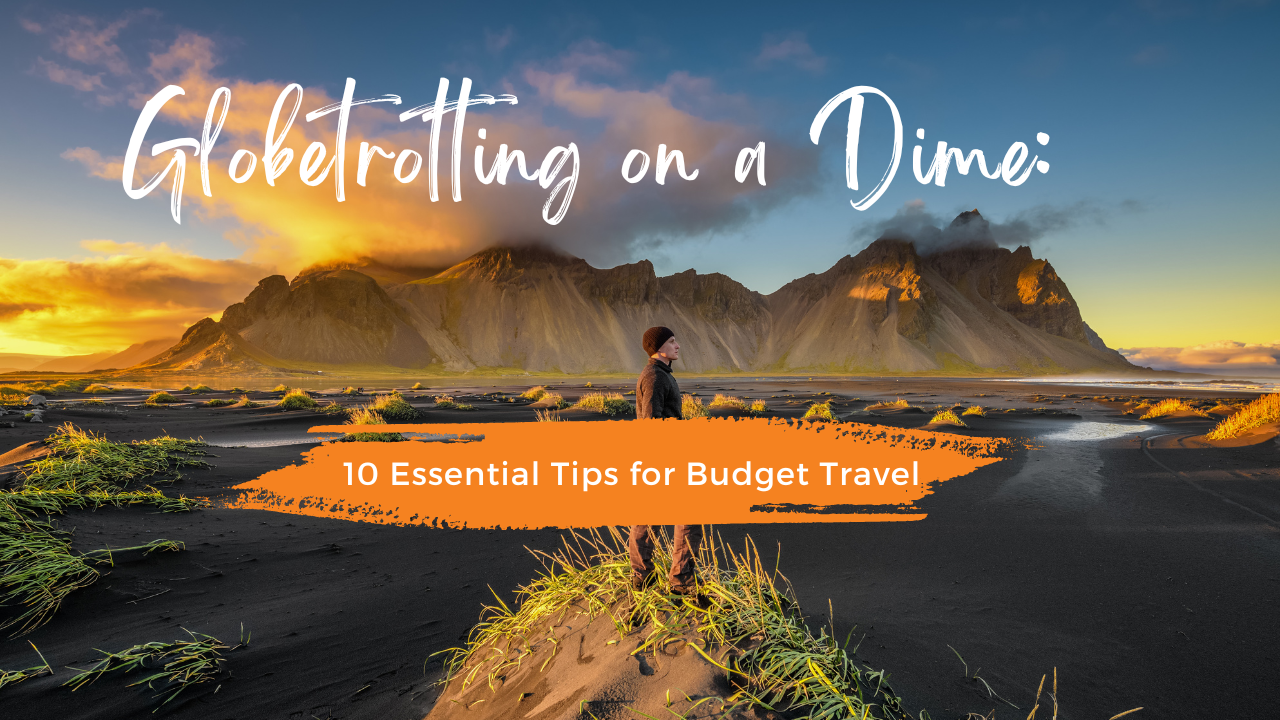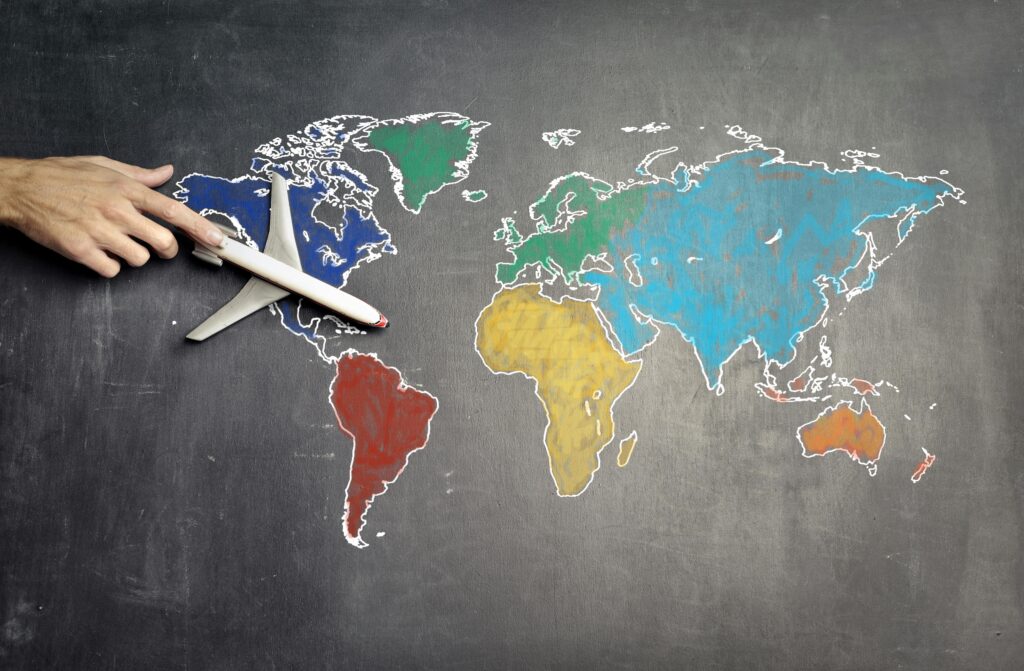
Globetrotting on a Dime: 10 Essential Tips for Budget Travel
1. Plan Your Trip Strategically

1.1. Choose budget-friendly destinations
When it comes to traveling on a budget, picking the right destination can make a world of difference. Countries like Thailand, Vietnam, and India offer incredible experiences at a fraction of the cost you’d spend in Western Europe or North America. I remember my trip to Bali, where I was amazed at how far my money could go. A delicious meal for $2, a beautiful beachfront bungalow for $20 a night – it felt like I was living like royalty on a shoestring budget!
1.2. Travel during off-peak seasons
Traveling during the shoulder season or off-peak times can save you a bundle. Not only are flights and accommodations cheaper, but you’ll also enjoy fewer crowds. I once visited Paris in November, and while it was a bit chilly, I had the Louvre almost to myself and scored amazing deals on hotels.
1.3. Book flights and accommodations in advance
Planning ahead can lead to significant savings. I always try to book my flights at least two months in advance and keep an eye out for special promotions. The same goes for accommodations – many hotels and hostels offer early bird discounts that can really add up.
2. Find Affordable Accommodations
2.1. Explore hostels and budget hotels
Hostels aren’t just for college students anymore! Many offer private rooms and great amenities at budget-friendly prices. I’ve stayed in some hostels that rivaled boutique hotels, complete with rooftop bars and organized social events.
2.2. Consider homestays and couchsurfing
Staying with locals can be an incredible way to save money and get an authentic cultural experience. I’ve used Couchsurfing in several countries and made lifelong friends while enjoying free accommodation. Just remember to always prioritize safety and trust your instincts.
2.3. Try camping or house-sitting
For outdoor enthusiasts, camping can be a great way to save on accommodations while enjoying nature. House-sitting is another option that can provide free lodging in exchange for taking care of someone’s home or pets. I once house-sat in the Australian countryside and had an entire farm to myself – talk about a unique experience!
3. Save on Transportation
3.1. Use public transit instead of taxis
Public transportation is often the most cost-effective way to get around in cities. In Tokyo, I was impressed by the efficiency of their metro system – it was not only cheaper than taxis but often faster too!
3.2. Walk or rent bicycles for local exploration
Walking or cycling is not only budget-friendly but also a great way to really see a city. I love renting bikes in places like Amsterdam or Copenhagen, where the cycling culture is strong and the infrastructure is bike-friendly.
3.3. Look for ride-sharing options
Apps like BlaBlaCar can be a great alternative for intercity travel. I’ve used it in Europe and found it to be much cheaper than trains or buses, plus I got to meet some interesting locals along the way.
4. Eat Like a Local
4.1. Visit local markets and street food vendors
Some of the best (and cheapest) food I’ve had while traveling has been from street vendors or local markets. In Bangkok, I discovered the joy of mango sticky rice from a small cart – it cost less than a dollar and was absolutely delicious!
4.2. Cook your own meals when possible
If you’re staying somewhere with kitchen access, cooking your own meals can save you a lot of money. I love visiting local grocery stores and markets to pick up ingredients – it’s a cultural experience in itself!
4.3. Take advantage of free breakfasts at accommodations
When booking accommodations, look for places that offer free breakfast. It’s an easy way to save money on one meal a day, and you can often pack a snack for later too.
5. Find Free or Low-Cost Activities
5.1. Research free walking tours
Many cities offer free walking tours led by knowledgeable locals. I’ve taken these in cities from Krakow to Quito and always learn something new. Just remember that while they’re technically free, it’s customary to tip your guide.
5.2. Visit museums on free admission days
Many museums have certain days or hours when admission is free. In Paris, for example, many museums are free on the first Sunday of each month. With a bit of planning, you can enjoy world-class art and culture without spending a dime.
5.3. Explore nature and public spaces
Some of the best experiences while traveling are completely free. Hiking in national parks, relaxing on public beaches, or wandering through bustling markets can all be done without spending money. I have fond memories of picnicking in London’s Hyde Park, watching the world go by without spending a penny.
6. Utilize Travel Rewards and Discounts
6.1. Sign up for travel rewards credit cards
If used responsibly, travel rewards credit cards can help you earn free flights and hotel stays. I’ve managed to fly business class and stay in luxury hotels using points I’ve accumulated over time.
6.2. Join loyalty programs for airlines and hotels
Even if you don’t travel frequently, joining loyalty programs is free and can lead to perks and discounts over time. I always make sure to sign up, even if I’m only planning to fly with an airline once.
6.3. Look for student, senior, or military discounts
If you qualify for any of these discounts, always ask if they’re available. You’d be surprised how many places offer them, even if they’re not advertised.
7. Pack Smart to Avoid Extra Costs
7.1. Bring versatile clothing to mix and match
Packing light not only saves you on baggage fees but also gives you more flexibility. I try to pack clothes that can be easily mixed and matched, and I’m not afraid to do laundry on the road.
7.2. Pack essential toiletries to avoid buying abroad
Toiletries can be surprisingly expensive in some countries. I always pack travel-sized essentials to avoid having to buy them at inflated prices.
7.3. Include a reusable water bottle and snacks
A reusable water bottle can save you money and reduce plastic waste. I also always pack some snacks for long travel days – it’s much cheaper than buying food at airports or train stations.
8. Be Flexible with Your Plans
8.1. Consider alternative destinations
Sometimes, being open to alternative destinations can lead to great savings and unexpected adventures. I once found a great deal on a flight to Croatia when I was originally planning to go to Italy – it ended up being one of my favorite trips!
8.2. Be open to last-minute deals
If your schedule allows, being flexible with your travel dates can lead to significant savings. I’ve scored some amazing last-minute deals on both flights and accommodations by being willing to travel on short notice.
8.3. Adjust your itinerary based on local prices
Once you’re at your destination, be willing to adjust your plans based on local prices. Maybe that fancy restaurant isn’t worth the splurge, but you discover an amazing local food market instead.
9. Use Technology to Your Advantage
9.1. Download money-saving travel apps
Apps like Hopper for flight predictions, or XE for currency conversion, can be invaluable tools for budget travelers. I always make sure my phone is loaded with useful apps before a trip.
9.2. Use price comparison websites
Sites like Skyscanner for flights or Booking.com for accommodations can help you find the best deals. I always check multiple sites before making a booking.
9.3. Connect with other travelers online for tips
Online forums and social media groups can be great resources for budget travel tips. I’ve gotten some of my best travel advice from fellow travelers in Facebook groups dedicated to budget travel.
10. Work or Volunteer While Traveling
10.1. Look for work exchange opportunities
Websites like Workaway or WWOOF offer opportunities to work in exchange for food and accommodation. I spent a month working on a farm in New Zealand this way, and it was an incredible experience that cost me very little.
10.2. Teach English abroad
If you’re a native English speaker, teaching English abroad can be a great way to fund your travels. I taught in South Korea for a year and was able to save money while exploring a new country.
10.3. Find seasonal jobs in tourist areas
Seasonal work in tourist areas can be a fun way to extend your travels. I once worked as a ski instructor in Canada for a season – I got to improve my skiing while earning money and meeting people from all over the world.
Summary
Traveling on a budget doesn’t mean sacrificing experiences – in fact, it often leads to more authentic and memorable adventures. By planning strategically, being flexible, and thinking creatively, you can explore the world without breaking the bank. Remember, the best travel experiences often come from unexpected places and don’t always have a high price tag attached.
Frequently Asked Questions
- How much money should I save before traveling on a budget?The amount you need to save depends on your destination, travel style, and trip length. As a general rule, I’d recommend having at least $50 per day for budget travel in most countries, plus extra for flights and unexpected expenses.
- Is it safe to stay in hostels or use couchsurfing?Generally, yes, but always read reviews, trust your instincts, and take basic safety precautions. I’ve had great experiences with both, but it’s important to be aware and careful.
- How can I avoid common tourist traps and overpriced attractions?Research beforehand, ask locals for recommendations, and don’t be afraid to venture off the beaten path. Some of my best travel experiences have been in places I’d never heard of before arriving in a country.
- What are some creative ways to earn money while traveling?Besides teaching English or seasonal work, you could freelance online, start a travel blog, or even pet-sit internationally. I’ve met travelers who fund their journeys in all sorts of creative ways.
- How do I balance saving money with enjoying my travel experience?It’s all about prioritizing what’s important to you. I save on things like accommodations and transportation so I can splurge on experiences or meals that are really special to me. Remember, travel is about creating memories, not just ticking off expensive attractions.


